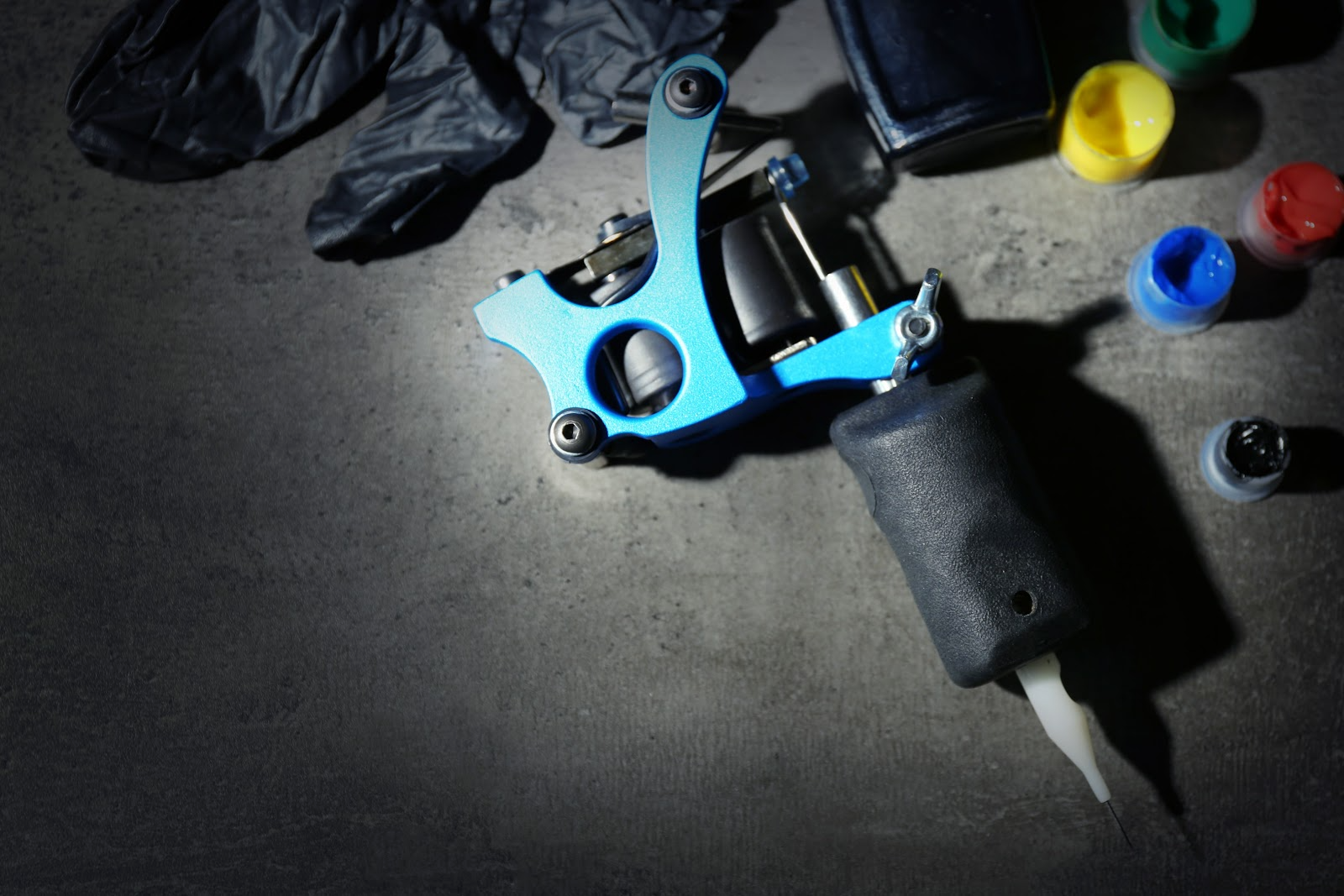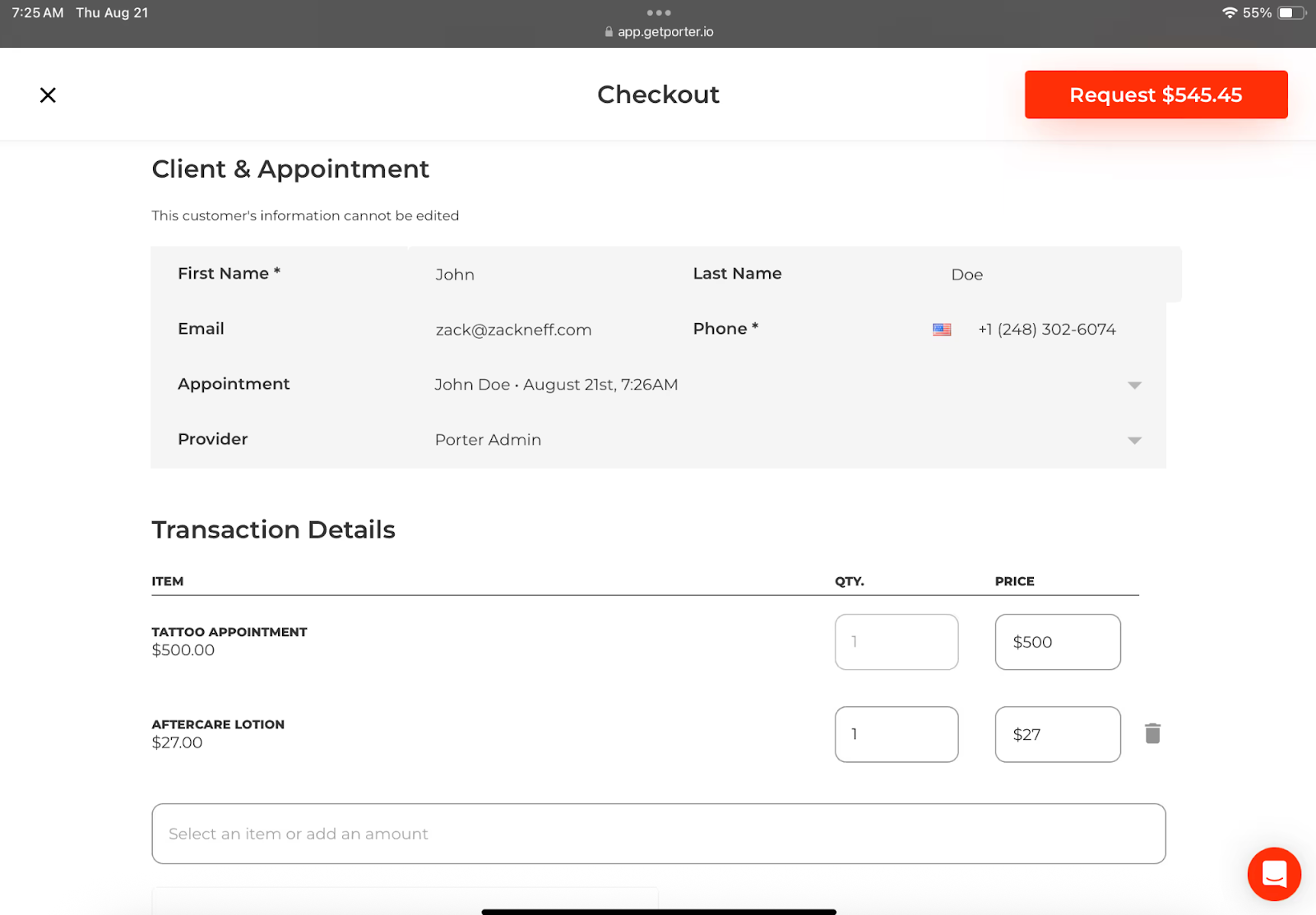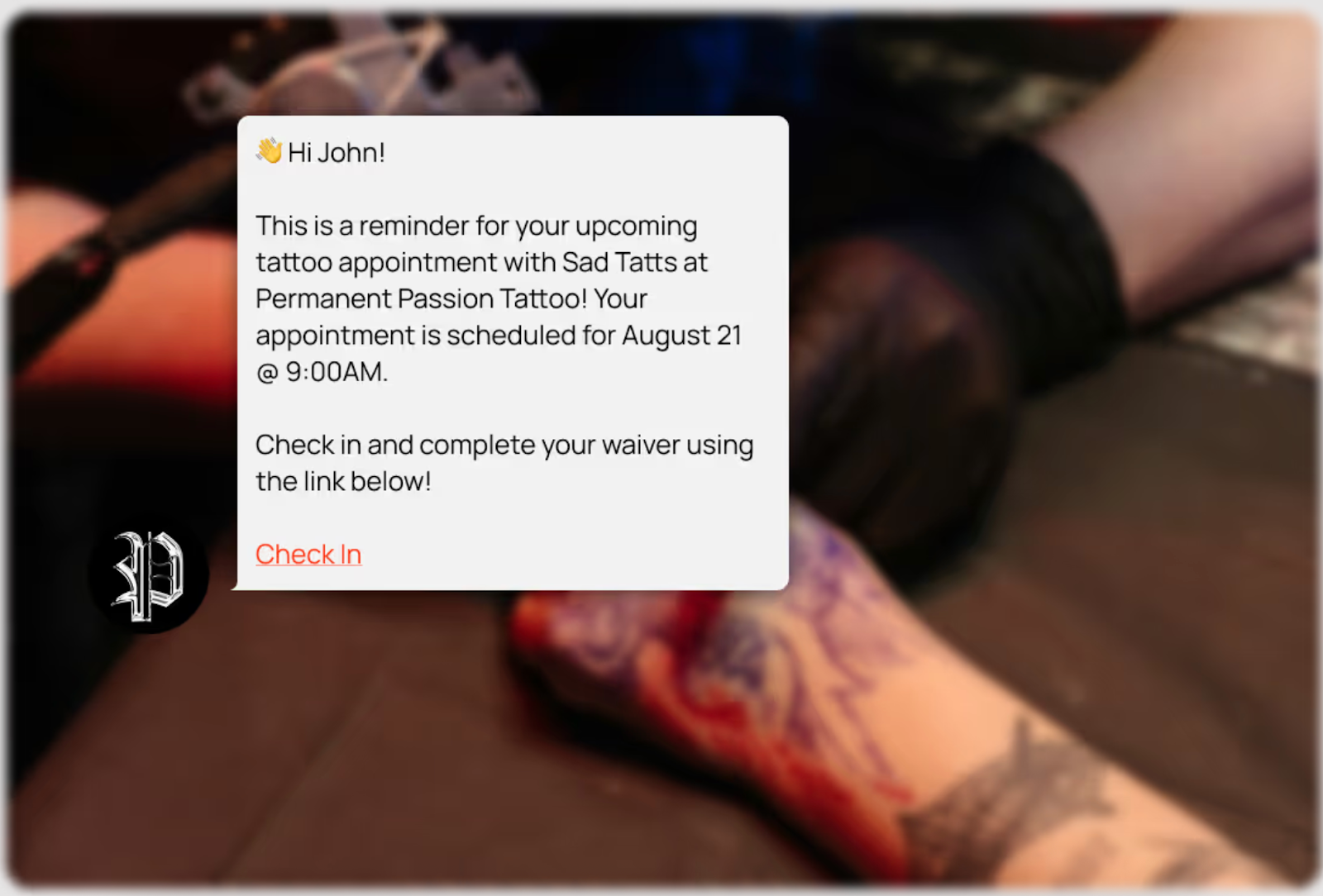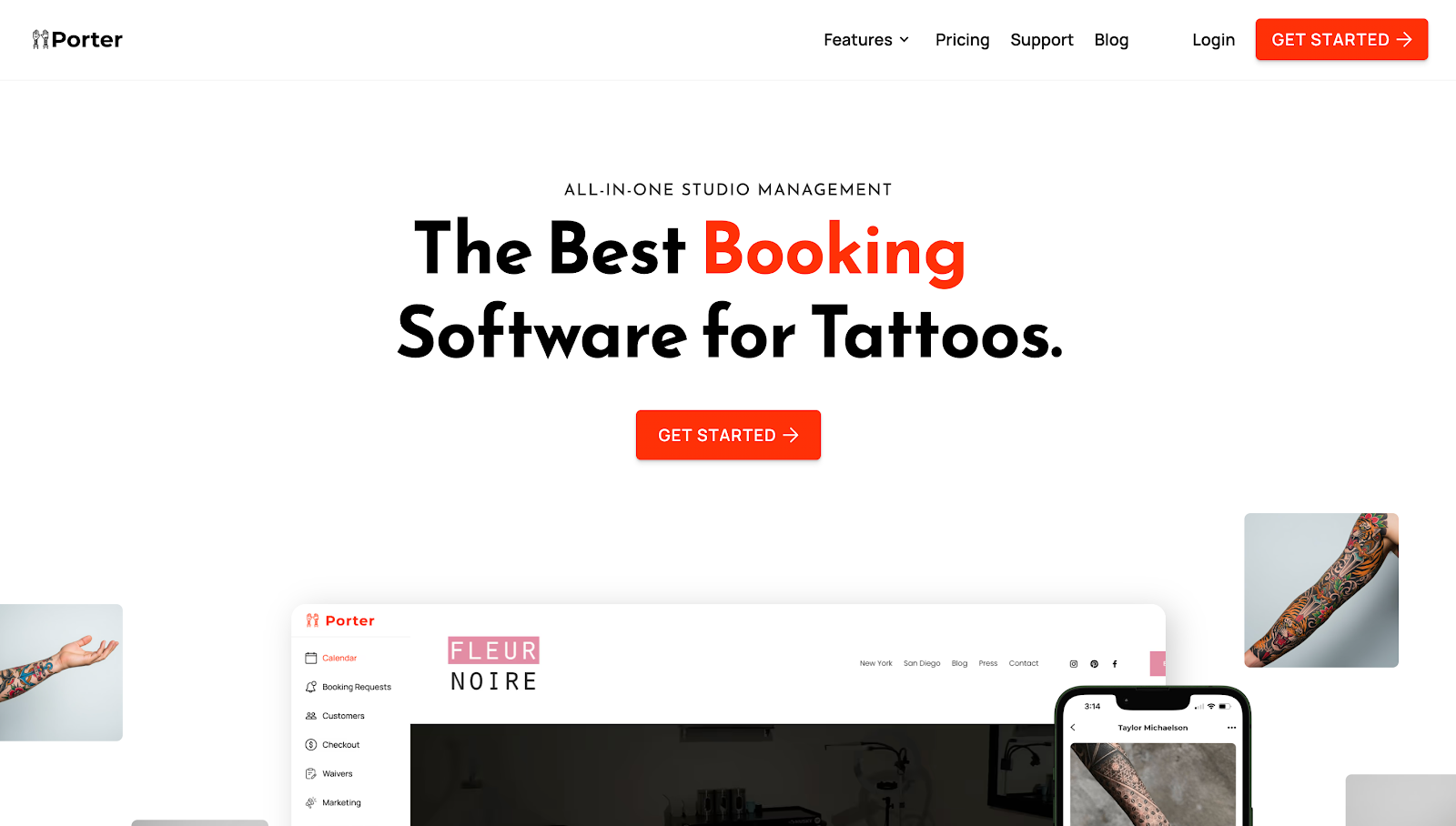Opening your tattoo shop can be exciting. Taking this step means you’re ready to create a space that reflects your art style and gives clients a place they can trust.
But let's be honest: setting up your own shop can feel overwhelming if you don't have a clear plan. From picking a location and getting the right licenses to promoting your studio, there are several things to consider.
Fortunately, this tattoo shop setup guide will walk you through every step. We'll cover everything you need to know to open and run a successful tattoo shop.
Step-by-Step Guide on Opening a Tattoo Shop
Follow these 16 steps to start a tattoo business.
1. Define Your Vision and Target Market
The first step is to determine what kind of tattoo shop you want to create.
Are you opening a busy tattoo parlor where people can walk in anytime, a private studio that works by appointment only, or a boutique-style space with a more exclusive feel?
After defining the type of shop, think about who you want to serve. Are you looking for a steady flow of walk-ins who want quick tattoos? Or do you want to focus on booked sessions for custom pieces?
If you're unsure, you can search for other shops near your target location. Look for gaps in the tattoo industry that your studio can fill.
2. Develop a Business Plan
Once you have a clear vision, the next step is to turn that idea into a detailed business plan. This keeps you organized and shows lenders or investors that you’re serious about starting a tattoo shop.
Include a mission statement that sums up what your tattoo studio stands for and a list of services you will offer.
You should also develop a marketing plan that explains how you’ll attract clients, along with financial projections that show expected costs and income.
3. Obtain Legal Requirements and Licensing
Before you open your shop, you need to take care of all legal requirements. Doing so protects your tattoo business, your potential clients, and your reputation.
Most states and counties require a tattoo license, health department approval, and individual tattoo artist certifications. You may also need zoning approval to confirm that your shop location is allowed for this type of business.
Always check specific state and local requirements, since varying regions have different laws.
It's also important to apply for your business licenses before your opening date, as approval can take weeks.
4. Plan Your Budget
Once your legal paperwork is in motion, it’s time to figure out how much money you’ll need to open and run your tattoo shop.
Set a clear budget breakdown to avoid overspending and ensure you have enough cash to cover the first few months of expenses.
Start with one-time costs, such as security deposits, furniture, and tattoo equipment.
Then, add ongoing fees, like rent, utilities, tattoo artist payroll, supply restocking, insurance, and advertising costs.
You should also consider other hidden expenses, such as training fees, equipment maintenance, and taxes.
After setting a budget, decide how to fund your new tattoo shop. Here are common options:
- Self-funding: If you have enough savings, you can use them to cover your start-up costs. This gives you full control of your tattoo business and avoids interest payments. However, it can be risky if you drain all your personal funds.
- Business loan: Many banks and credit unions offer loans for new businesses. You’ll need a solid business plan and a good credit score to qualify. Loans let you spread out costs over time, but they come with interest that you should repay.
- Grants and subsidies: Some local governments and small business programs offer grants that don’t need to be repaid. These are competitive, so apply early and have strong documentation to show why your tattoo shop should receive funding.
5. Select a Business Name
Choose a business name that reflects the style of tattoos you offer and the atmosphere of your shop.
Start by brainstorming words that connect to your art style, values, and the experience you want clients to have.
Check online to see if the name is already in use by another shop. Then, look up available domain names if you plan to create a business website.
Gather feedback from family, friends, or loyal clients if you've already been freelancing as a tattoo artist.
A unique name makes it easy for potential customers to remember you. It also helps you stand out from other tattoo studios in the area.
Here are some great examples for inspiration:
- Flo Tats: Like Flo, you can use your name for your business and add the word "tattoo" to make it more connected to your work.
- Fleur Noire Tattoo: You can also come up with a foreign term that adds allure to your tattoo shop, similar to Fleur Noire Tattoo, which is a French word that translates to "black flower."
- Hermosa Ink Collective: Connect your business name to your location, like what Hermosa Ink Collective did. Their tattoo studio is situated in the heart of Hermosa Beach in Southern California.
6. Choose the Right Location
Where you open your tattoo shop can make or break your business. The right location helps you attract the clients you want and keeps your operating costs manageable.
Look for a space that fits the type of tattoo business you want. For example, a street shop might do well near busy retail areas with a lot of foot traffic, while a private tattoo studio might work better in a quieter part of town.

Consider practical factors, like parking, public transit access, and street visibility. Make sure the space meets the state's health department requirements for plumbing and layout.
Compare rent prices in different neighborhoods to find the ideal business location that matches your budget.
Before you sign a lease, read it carefully and ask about things like tenant improvements or the ability to expand later when your tattoo business grows.
7. Design a Functional Studio Layout
After selecting a business location, focus on how to arrange the space so it works for both clients and tattoo artists.
A functional layout makes your own tattoo studio easier to run and leaves customers with a great first impression.
Make sure to have a waiting room near the entrance. This way, clients have a comfortable place to sit and fill out tattoo waivers or consent forms.
Then, separate workstations to give tattoo artists enough space to work without feeling crowded.
Don't forget to include a dedicated area for sterilization and supply storage to keep everything organized and safe.
Good lighting, proper ventilation, and easy-to-clean surfaces also make your tattoo shop look more professional.
8. Establish a Legal Business Entity
Once you’ve planned the layout, it’s time to make your shop official by choosing a business structure. The type you choose affects your taxes, liability, and how to grow your tattoo business in the future.
Many tattoo shop owners choose to form a limited liability company (LLC) because it protects personal assets if something goes wrong. Other options include sole proprietorships, partnerships, or even corporations, depending on your goals.
After selecting the business structure, get an Employer Identification Number (EIN) through the Internal Revenue Service (IRS). This number is required for taxes and banking purposes.
Lastly, register your company with your state. You may need to submit paperwork, such as the Articles of Incorporation, Articles of Organization, or Partnership Agreements. You should also purchase an insurance policy and comply with environmental regulations.
9. Open a Business Bank Account
Open a separate bank account just for your tattoo shop.
Keeping business and personal money apart makes bookkeeping easier, simplifies tax filing, and helps you see how your shop is really performing. It also makes your tattoo shop look more professional to customers, vendors, and future lenders.
When choosing the right bank, compare a few options and consider the following factors:
- Low fees: Look for banks that offer low or no monthly fees and free transactions.
- Minimum account balance: Avoid bank accounts that penalize you if your balance drops below a set amount, especially when cash flow is tight in the first months.
- Online banking: Make sure you can deposit checks, pay bills, and view balances online or through an app.
- Merchant services: Choose a bank that works well with tattoo POS systems so you can accept card payments without issues.
- Local support: A bank with a nearby branch can be helpful when you need in-person service.
Consider using accounting software to track all of your tattoo shop’s expenses and income.
10. Purchase and Set Up Tattoo Equipment
Your equipment is the backbone of your tattoo shop. Without the right tools, you can’t deliver safe and high-quality tattoos.
Investing in reliable gear helps you work efficiently, meet health standards, and give clients the best possible experience.

You can purchase equipment from reputable tattoo supply stores, online suppliers, or trade shows where you can see products in person. Always buy from trusted sources to avoid cheap, unsafe knock-offs.
Here's a checklist of the tattoo studio equipment you need:
Tattooing Equipment
- Professional tattoo machines (coil, rotary, or wireless)
- Power supplies, foot pedals, and clip cords
- Tattoo needles, tubes, grips, and cartridge systems
- Ink sets in a variety of colors and tones
- Adjustable tattoo chairs and beds for clients
- Tattoo artist stools and armrests
- Tattoo reference and sketchbooks
Health and Safety Products
- Autoclave for sterilizing reusable tools
- Disposable gloves, razors, and machine covers
- Workstation disinfectants and cleaning solutions
- Needle waste containers and biohazard waste bins
- Barriers, clip cord covers, and surface protection film
- Medical masks
Aftercare Products
- Tattoo cream
- Bandages and protective wraps
- Ointments and healing balms
- Protective film dressing
- Printed aftercare cards or written instruction sheets
11. Hire Tattoo Artists
The team you build will shape the reputation of your tattoo studio. Customers often return because they trust the artist, so hiring skilled and reliable people is one of the most important steps you’ll take.
While you don’t need to fill your studio with famous artists, you should look for professionals with strong portfolios and a commitment to hygiene standards.
Hire a mix of experienced and up-and-coming talent to give clients more style options and help your shop appeal to different tattoo lovers.
Conduct interviews and trial sessions to find the ideal employee, since most artists work differently. For example, some focus on speed, while others take time to create highly detailed custom pieces.
Talk about expectations upfront, including schedule, commission, or booth rent, and shop policies.
Building a team that shares your vision creates a consistent experience for customers and keeps your business running smoothly.
12. Implement Strict Health and Safety Protocols
Meeting health and safety standards isn’t just about passing state inspections. Keeping your shop clean and safe protects both your clients and your artists.
Every artist should wear gloves during the entire tattoo process, use sterilized tools, and follow bloodborne pathogen training guidelines.
Clean all work areas between clients, and keep single-use items like needles and razors sealed until they are needed.
Have a dedicated sterilization area with an autoclave. Then, make sure biohazard waste is disposed of correctly.
You should also post health and safety rules where both staff and customers can see them. Doing so can prevent infections, reduce liability risks, and show clients that their well-being comes first.
13. Set Reasonable Tattoo Pricing and Payment Policies
Tattoo pricing plays a big role in attracting clients and keeping your shop profitable. Decide whether you’ll charge by the hour or use a flat fee for flash art and certain designs.
Hourly rates work well for larger pieces, while flat pricing can make smaller tattoos easier for clients to budget.
Your rates should reflect your artists’ skill level, shop expenses, and local market rates.
To protect your schedule, require deposits for booked appointments and clearly state whether they are refundable. This prevents last-minute cancellations and keeps your calendar organized.
You should also offer multiple payment methods, such as cash, card, or payment links, to make it easier for clients to pay and bring in more revenue over time.
Put your pricing and payment policies in writing and share them with clients before the session to avoid confusion.
Consider investing in all-in-one tattoo studio management software like Porter to check out appointments directly from your booking calendar.

14. Build a Strong Online Presence
Your shop’s online presence is just as important as your physical location.
It's important to create accounts on at least one social media platform where your ideal customers spend time, such as Instagram, Pinterest, or TikTok.
Use your profile page to share high-quality photos of your work, videos of the tattoo process, and updates about promotions or events.
Next, list your shop on Google Business Profile and Google Maps so clients can easily find you when they use search engines. Include your address, hours, and phone number, along with other relevant information like parking options and accessibility.
Finally, add an online booking form or appointment link where customers can schedule an appointment with their favorite artists at your tattoo shop.
The easier you make it for people to find you and see your work, the faster you can build a loyal customer base.
15. Develop a Marketing Plan
A marketing plan helps you attract clients consistently instead of relying on random walk-ins.
Start by setting clear goals. Do you want to increase appointments, promote flash events, or build awareness of a new artist joining the team?
From there, decide which marketing channels you’ll use. Social media, email newsletters, and local ads can all work together to bring in new customers and remind past clients to come back.
Plan promotions for slower months, such as discounted touch-up days or themed flash designs.
Don't forget to track the results of your campaigns so you can see what works and what doesn’t.
16. Map Out the Customer Journey
Think about every step a customer takes from the moment they find your shop to the time they come back for another tattoo. A smooth journey makes clients feel cared for and keeps them coming back.
Start with appointment scheduling. Make it easy for customers to book an appointment with you through checkout links and customizable booking forms.
Next, send automated reminders so clients don’t forget their appointments. You can also include instructions on how to prepare for their tattoo session.

Keep communication clear and friendly before and during the appointment. Answer any questions customers may have and explain each step of the process.
After the tattoo is done, give detailed aftercare instructions both verbally and in writing so clients can heal properly. A few days later, follow up to check how they’re doing and gently ask for an online review.
Consistent communication at every step of the tattoo journey builds trust, strengthens relationships, and encourages repeat visits.
How to Expand Your Tattoo Shop After Opening
Now that your tattoo shop is up and running, it’s time to focus on growth and long-term success.
Offer New Services and Products
One of the best ways to grow your business is to add new services or sell other products. You can offer piercings, permanent makeup, or even tattoo removal if there’s demand in your area.
Consider selling retail products, such as aftercare creams, branded merch, or gift cards, to bring in extra income between appointments.
Before adding anything new, ask clients what they want and study competitors to see what’s missing.
Offering new options helps you stand out and gives customers more reasons to come back. This helps increase revenue without raising tattoo prices.
Collect Client Reviews and Testimonials
Happy customers can be your best marketing tool. Encourage them to leave reviews on Google, Yelp, or social media, and display great testimonials on your website.
Collect client information, such as email addresses and phone numbers, to send follow-ups and reminders to leave feedback.
Consider offering a small reward, like a discount on future work, for clients who leave honest reviews.
The more reviews you gather, the more confident new customers will feel when choosing your shop over another.

Invest in Advanced Equipment
As your shop grows, you need better tattoo equipment to speed up workflow and improve quality. Invest in newer tattoo machines, power supplies, and better furniture to make artists more productive.
These upgrades show clients that you care about offering a professional experience. At the same time, they may attract talented tattoo artists who want to work in a well-equipped space.
Explore New Locations
If your tattoo studio stays busy and has a strong reputation, opening a second location could be a smart move.
Research potential areas carefully. Look for places with growing populations and limited tattoo competition.
Consider training one of your senior artists to manage the second location so you don’t stretch yourself too thin.
Then, use what you’ve learned from running your first tattoo shop to set up the new one even better.
Build Community Partnerships
Connecting with your local community is another way to grow your tattoo studio.
Partner with nearby businesses for cross-promotions. These include coffee shops, salons, and clothing boutiques, which often share a similar audience.
Sponsor local events or art shows to get your name in front of more people.
Community partnerships build goodwill and can lead to word-of-mouth referrals that no ad campaign can buy.
Manage Your Tattoo Shop Stress-Free with Porter

You’ve done the hard work of planning your tattoo shop setup. Now, it's time to make your shop simple to manage.
Porter helps streamline your tattoo studio's operations by combining booking, payments, POS, marketing, and analytics in one platform.
It handles scheduling and calendar management from your website or Instagram, auto-collects deposits to reduce no-shows, and attaches liability waivers and intake forms with no extra steps.
Porter also integrates payments and POS tools that let you check out customers seamlessly, track revenue, and view analytics from a single dashboard.
Plus, built-in marketing tools help you grow your tattoo shop and drive repeat visits from previous customers.
Businesses that used Porter reported receiving 15% more bookings, 17% more revenue per appointment, a 44% increase in tips, and 68% fewer no-shows and cancellations.
Get started today and enjoy these results for yourself!
FAQs About Tattoo Shop Set Up
How much does it cost to set up a tattoo shop?
The exact cost of opening a tattoo shop varies based on location, size, and equipment. However, most shops spend between $20,000 and $50,000 to get started.
How to set up a tattoo shop?
Setting up a tattoo parlor involves several steps. You should obtain the necessary permits and licenses, secure a legal business entity, choose the right location, purchase tattoo equipment, hire artists, and implement strict health and safety standards. Add online booking, clear payment options, and a marketing plan to attract customers once your doors are open.
Is owning a tattoo shop profitable?
Yes, owning a tattoo studio can be profitable if managed well. Profitability depends on your expenses, artist productivity, and client volume. Tattoo shops with consistent bookings, good pricing policies, and strong marketing see healthy margins. Focus on building repeat business and offering great service to keep clients coming back.



.avif)


